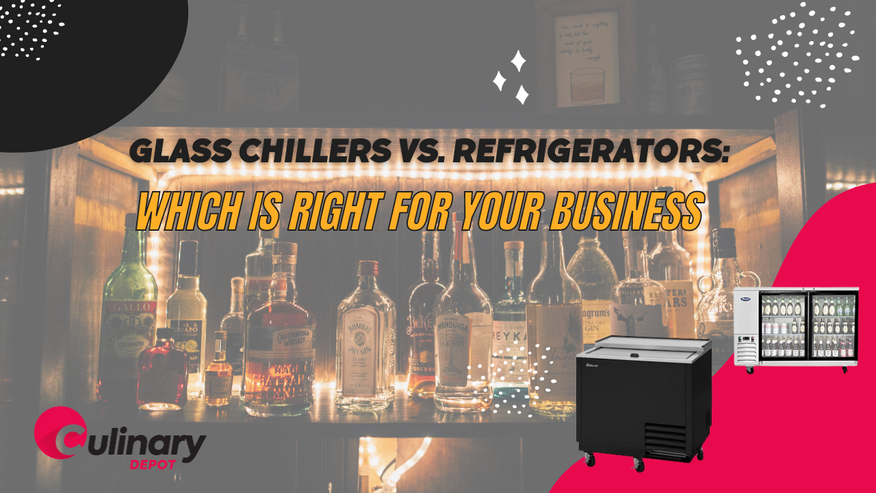May 7th 2024 - Team Member
Glass Chillers vs. Refrigerators: Which is Right for Your Business
When it comes to storing perishable items in a commercial kitchen, having the right equipment can make all the difference. Glass chillers and refrigerators are two popular options, each with its own set of benefits and drawbacks. In this article, we'll compare glass chillers and refrigerators to help you determine which is the right choice for your business.
Understanding Glass Chillers and Refrigerators

Glass Chillers:
Glass chillers are designed to quickly chill glasses to the ideal serving temperature. They use a combination of cold air and, in some cases, Carbon Dioxide to achieve rapid cooling. Glass chillers are typically used in bars and restaurants to serve cold beverages like beer, cocktails, and soft drinks.
Refrigerators:
Refrigerators, on the other hand, are versatile appliances used for storing a variety of food and beverages at a consistent temperature. They are available in various sizes and configurations, including reach-in and undercounter models. While refrigerators can also be used to chill glasses, they are not as specialized for this purpose as glass chillers.
Glass Chillers: A Closer Look
Glass chillers are specialized refrigeration units designed to quickly chill glasses and plates. They are commonly used in bars and restaurants to ensure that beverages and dishes are served at the ideal temperature. Glass chillers are typically compact and can be placed on countertops, making them ideal for establishments with limited space.
Pros of Glass Chillers:
- Rapid Cooling: Glass chillers can quickly cool glasses and plates, ensuring that beverages and dishes stay cold for longer.
- Space-Saving Design: Glass chillers are compact and can be placed on countertops, making them ideal for small businesses.
- Improved Presentation: Chilled glasses and plates can enhance the presentation of beverages and dishes, providing a more enjoyable dining experience for customers.
Cons of Glass Chillers:
- Limited Storage: Glass chillers are designed specifically for glasses and plates and may not have enough storage space for other perishable items.
- Higher Energy Consumption: Glass chillers may consume more energy compared to refrigerators, especially if they are used frequently.
Krowne KR-LC2GF-TT-E Built-In LED Light Royal Series Countertop Cube Liquid CO2 Glass Froster With Extended Lines
Refrigerators: A Closer Look
Refrigerators are versatile appliances that can be used to store a wide range of perishable items, including food and beverages. They come in various sizes and configurations, making them suitable for businesses of all sizes. Refrigerators are essential for maintaining the freshness and quality of perishable items.

Pros of Refrigerators:
- Versatility: Refrigerators can be used to store a wide range of perishable items, making them suitable for businesses that require diverse storage options.
- Ample Storage Space: Refrigerators come in various sizes and configurations, providing ample storage space for perishable items.
- Energy Efficiency: Modern refrigerators are designed to be energy-efficient, helping businesses save on energy costs.
Cons of Refrigerators:
- Slower Cooling: Refrigerators may take longer to cool glasses and plates compared to glass chillers, which can be a disadvantage in fast-paced environments.
- Lack of Specialization: While refrigerators are versatile, they may not provide the same level of specialized cooling as glass chillers.
Summit AL57G 23.63" W Stainless Steel Glass All-Refrigerator - 115 Volts 1-Ph
Conclusion
In conclusion, both glass chillers and refrigerators have their own set of advantages and disadvantages. The right choice for your business will depend on your specific needs and requirements. If you prioritize rapid cooling and space-saving design, a glass chiller may be the better option. However, if you require versatility and ample storage space, a refrigerator may be more suitable. Consider your business's unique needs and budget when making your decision.
Key Takeaways: Commercial refrigerators, such as glass door refrigerators, reach-in refrigerators, and undercounter refrigerators, offer ample storage space and energy-efficient models for businesses in the food service industry. Regular maintenance and cleaning of refrigeration units are essential for ensuring the safety of perishable products and maintaining food temperatures. Additionally, considering the operational costs and space requirements of different types of refrigeration units can help business owners make informed choices for their establishments.

